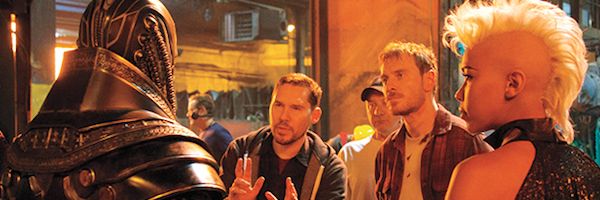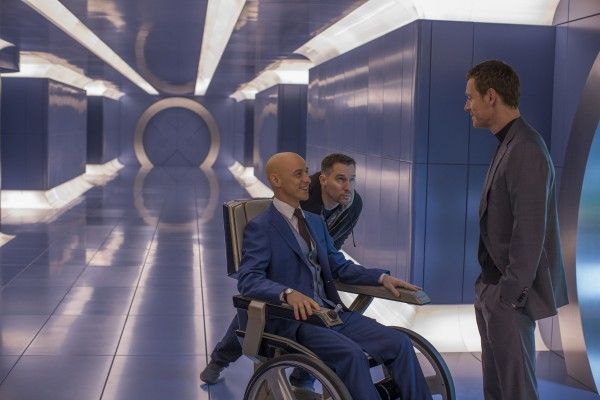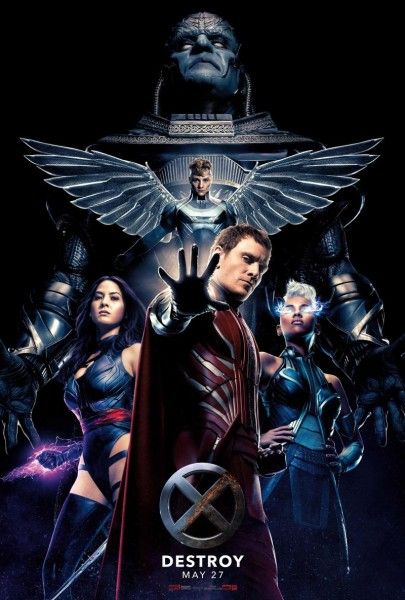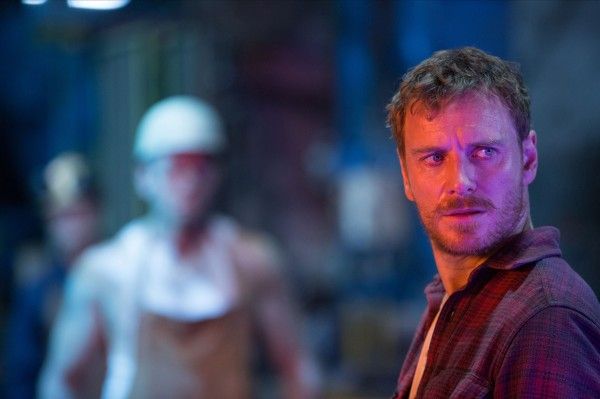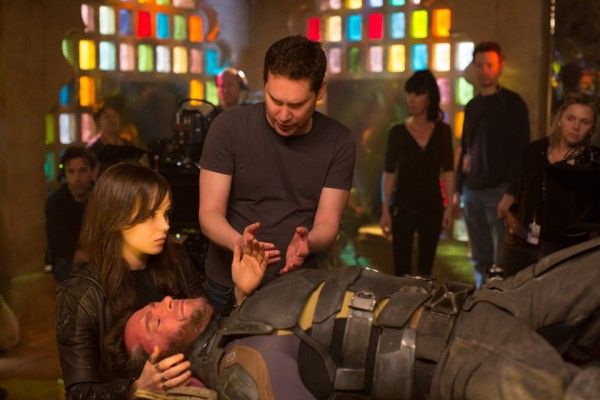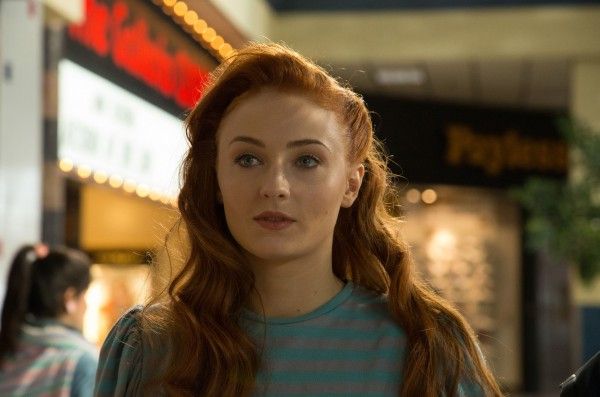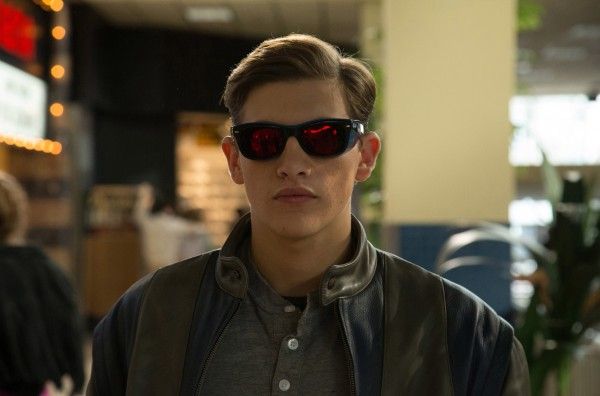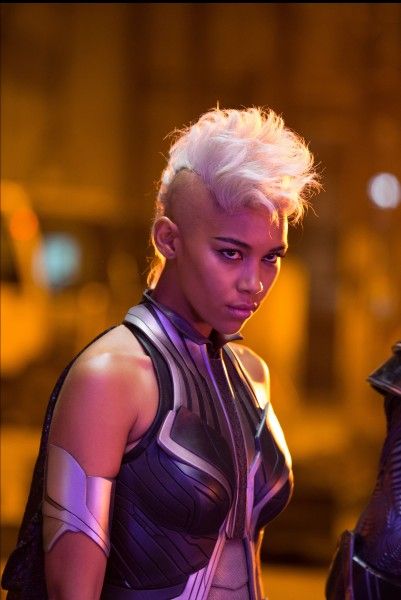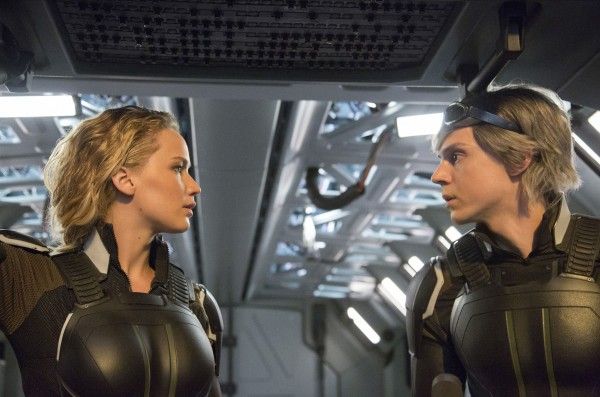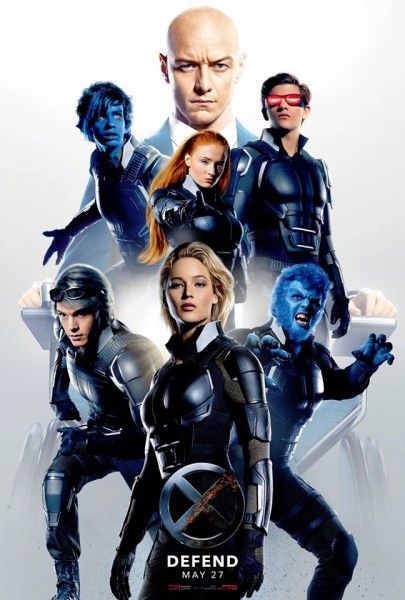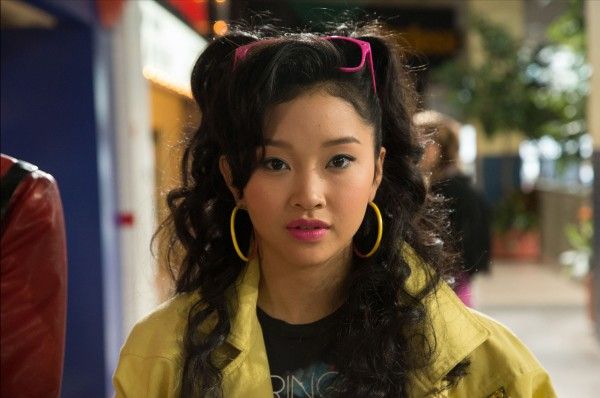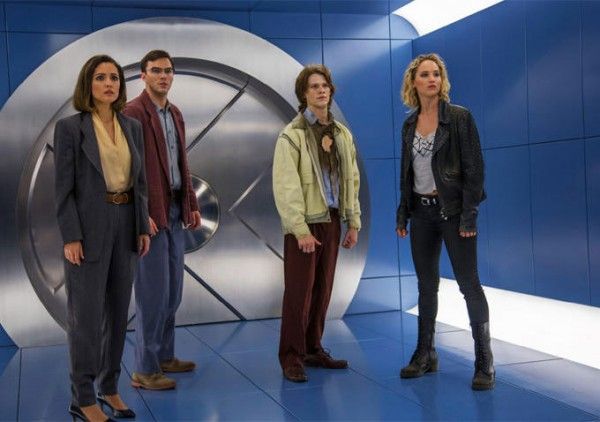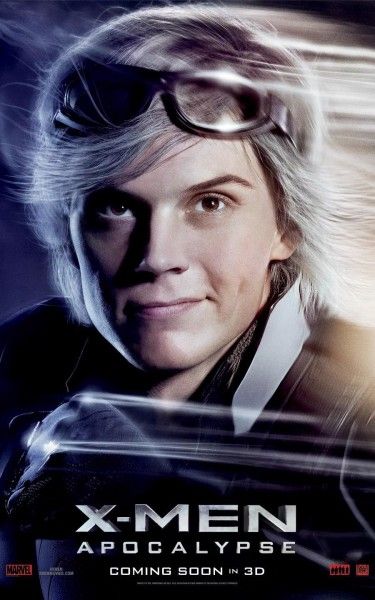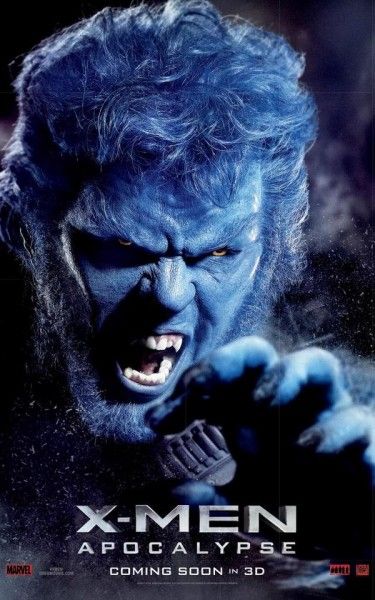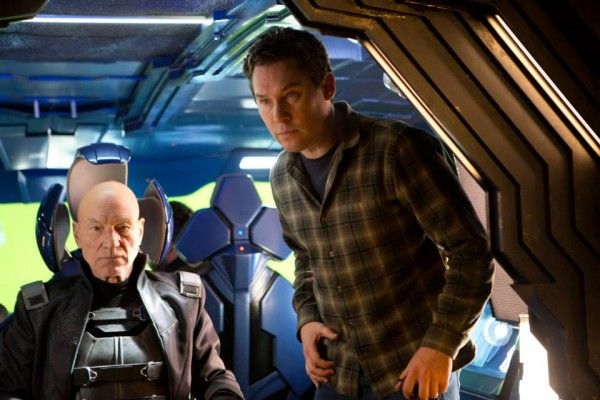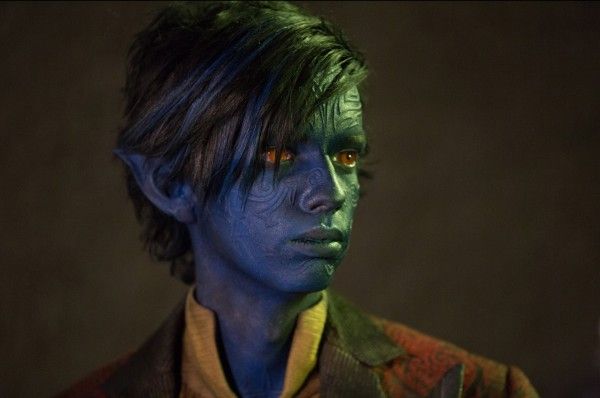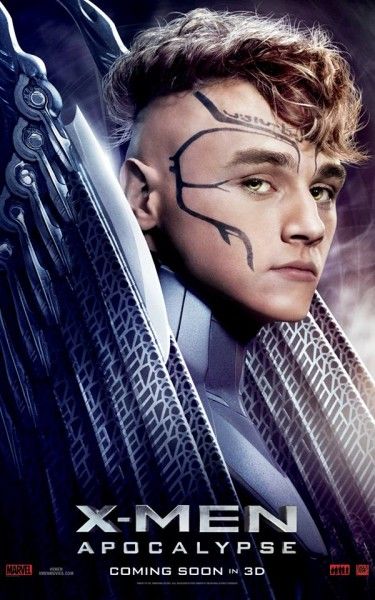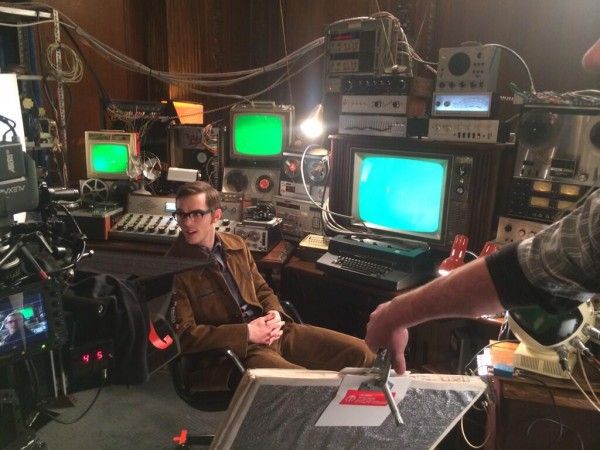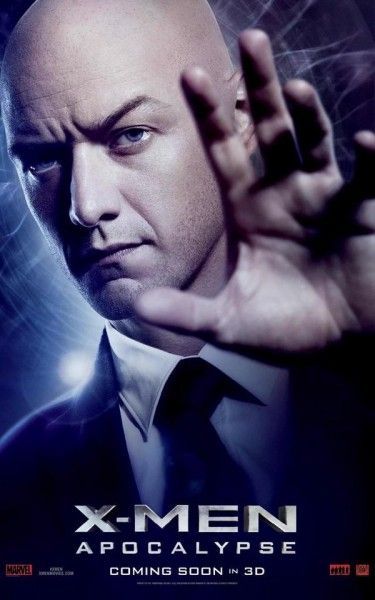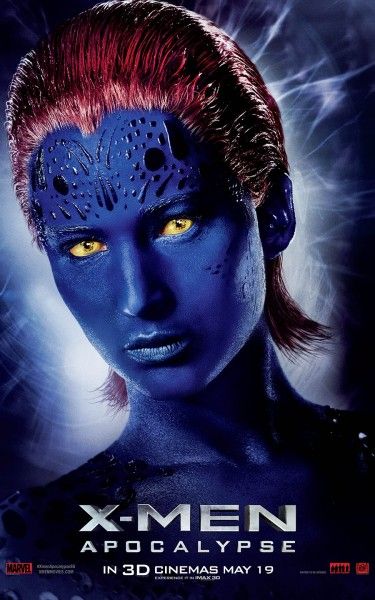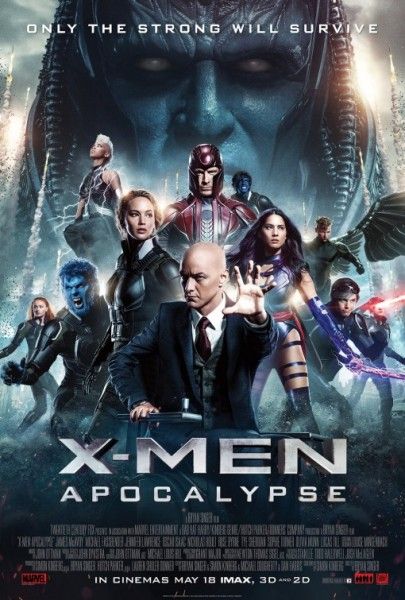One day last summer, in the gorgeous city of Montreal, I had one of the greatest experiences of my professional career. It was during the first of a two-day set visit for X-Men: Apocalypse, which I had the pleasure of attending along with a small group of reporters. Now set visits can sometimes be hit or miss, but if there’s one thing you can probably count on, it’s that your time speaking with the director is either extremely limited or completely non-existent. Which is entirely understandable—he or she is directing a feature film, and time is extremely limited already without having to also squeeze in a conversation with some eager reporters.
However, for X-Men: Apocalypse, director Bryan Singer was extremely generous with his time. The filmmaker wanted to wait until the end of the day to speak with us, after filming was completed, so he could really dig into some serious conversation without having to be pulled back to set once the next shot was ready. The result was a candid conversation with the filmmaker in his trailer that lasted over an hour in length, covering everything from the process of making an X-Men movie to the superhero genre at large.
This interview is positively massive in length, and given that it’s such a fascinating conversation, I’m presenting it in its entirety. You’ll notice that it’s very free-wheeling, covering a wide range of topics, but if you’re at all interested in the process of moviemaking or the career of Singer—who his really one of the godfathers of the modern superhero genre given that his 2000 film X-Men helped kick off this trend in the first place—I promise you it’s worthwhile.
As you read, you’ll see Singer discussing the origins of X-Men: Apocalypse and what drew him to this story, the 1980s influence, the new Quicksilver sequence, the motivations and design of Oscar Isaac’s titular character, creating Angel's wings, and where we find the main characters at the beginning of the movie. But the conversation also veers into Singer talking about his impact on the superhero genre as a whole and its evolution since 2000’s X-Men, his future with the X-Men franchise and how he’s kept rebooting his own characters, and he also talks extensively about the new timeline he created with Days of Future Past and what that means for the franchise going forward.
All this and much, much more is discussed, so again, if you’re at all interested in hearing a prolific blockbuster filmmaker talk at length about one of the most successful franchises of our time, please enjoy. X-Men: Apocalypse opens in theaters on May 27th.
What makes now, seven, eight movies into the franchise, the time to tell the Apocalypse story?
BRYAN SINGER: Because it's just so different. We've always treaded this theme of mutants vs humans and Apocalypse has two aspects that make him such a different character than I've traditionally explored in the universe. One is that he makes no distinctions between humans and mutants. He's interested in the Earth as a whole and the purity of civilization and the strongest. And secondly it deals with ancient mutantism, or the origins of the mutant state, or the origin of gods and religion. Which the X-Men universe has never touched upon any of those things and that stuff I loved when I was a kid. I read Chariots of the Gods when I was a kid, and I was fascinated with religion as a kid and cults and things like that. So that stuff made this so appealing to do, plus I love the characters so I love coming back with actors and people I know, and I love X-Men.
Can you describe your Apocalypse, this Apocalypse?
SINGER: The way I describe him the most, the best is he to me is the God of the Old Testament and all that comes with that. If there isn't the order and the worship then I'll open up the Earth and swallow you whole, and that was the God of the Old Testament. I started from there and when Oscar and I met we began discussing, since he isn't really God, he's the first mutant perhaps, but he's not God necessarily, he's imbued with certain unique powers. Some of them may or may not be from this Earth, we don't know. Then we started looking at cults and the nature of cults, because cult leaders, true cult leaders, develop god complexes and he always traditionally had four horsemen so I thought a cult has traditionally four factions to it that interest me. It has a political faction, and I'd always felt Magneto could fill those shoes. It always has a military faction, so Archangel could fill those shoes as the guardian. There's also youth faction, those that you're trying to seduce and grow into your cult, the young whose minds are malleable, and lastly the sexual component because cult leaders tend to sexualize their position and have sex with half the people in their cult. And the Psylocke character, who was a very bright character in the comic but is always looking for guidance and leadership. Always trying to find the right guy, so she starts with one and ends up with Apocalypse in this one. I always thought there was a mixture of ancient religion and cultism combined in the character of Apocalypse.
How did you settle on the look of Apocalypse? Because I think a lot of us were really happy to see in the Comic-Con footage when we were there, I think a lot of people would have gone mo-cap or CG and it was nice to see actual make-up effects.
SINGER: Whenever I can go physical I try to. It gives the actors something to play with. What did Nicholson say when he played The Joker? Let the costume do the acting? There's a lot more that goes into it than that but nonetheless it makes it real. It makes it real for the actor and it makes it real for the people who are playing against the actor than when they're wearing a green suit with dots on it. Once the people at Legacy could prove it to me that they could pull it off, it was very complicated how to do that. It was just complicated. Once I saw a few key designs, surfaces, shieldings, panels, artistry, I was like ‘Okay that's the guy, lets build it’. Let's make it real. If the character is a strange size or something then maybe you have to do CG, although we do get into a little of that. Angel, we didn't build the wings because they're twenty feet long. He's two characters, he's Angel then he's Archangel and either are very complex and those we clearly make room for but we always have to be careful. Whenever I'm telling my cinematographer 'Leave negative space for the wings, they're wings!' It's like let’s do an over the shoulder shot, 'No you’re blocking them with wings!' So you have to use your imagination and have a great guy like John [Dykstra, visual effects designer] who can run in there and remind you.
With Apocalypse having so many powers over the years in the comics I'm really interested to hear how you decided just what he'll be able to do in the movie. Some of the other people have been talking about how he can somehow amplify other people's powers?
SINGER: He does, he has a number of different powers that he's acquired over the years as he's moved from body to body, accumulating these various abilities. One of them is to imbue other mutants and to heighten their powers and abilities beyond anything they ever imagined. Secondly, he can shield from psychic powers, he can form shields so that it makes it harder for a psychic like Xavier to tap in and get to them. He's not a psychic himself though. He can amplify your power, transform you as a mutant but his ability to physically damage, destroy, or build is in the non-biological world. That's in the physical world, he can change the inorganic molecules of things. These are some of the powers that we're exploring and there's some epic things that he does towards the end of the picture. I have to say in the end his greatest power is the power of persuasion. The ability to know what he needs and who he needs it out of and to get it from them as he does with the horsemen, and as he has through civilization after civilization for tens of thousands of years.
When you say persuasion you don't mean like using a power on someone or do you mean charisma?
SINGER: Charisma, pure persuasion. Finding people at a time in a moment when there's emptiness, when there's a need. Finding them just at the right time as he does, and the hardest one is Erik. That's a big one. The journey that Erik takes in this movie, because the last movie was very much the journey of Charles, I think. He was an older man who made a mistake, now he's in this post-apocalyptic universe and he wishes he could go back in time. He can't, his body can't make it, so he sends back Wolverine, who’s not the best psychiatrist, to right his wrongs he had with Raven, and that's that story. It's really the story of Charles. This one the journey of Erik Lehnsherr is a very big part of this movie. I think the two biggest journeys are the journey of Erik, perhaps the journey of Raven, and on the younger side the journey of Scott and Jean and their story as young characters. One of the biggest challenges, and it’s very emotional and it’s somewhat dark, is getting Erik to that place where he would follow. Because Erik is a super villain. He's dropped stadiums on the White House, whatever he does, and to get him to a place where he's ready to go there with this character, with Apocalypse. That was one of the biggest challenges and there's a scene Fassbender does with this movie, you always wonder what’s going to make the cut but he did something that we were pulling the Kleenex out in the tent. I've never had that happen on the set.
There's some really funny parts too, I'm not making it sound like it. We rekindle romances, there's three romances we start together. One that I didn't really explore in Days of Future Past but I did when I wrote the story for First Class, between Hank and Raven. We've got Jean and Scott. Suddenly Xavier and Moira start getting reconnected, so that's all starting to happen too. So there's a lot of rebirths and stuff, but in the end ultimately this movie, in the final thing, this movie is about the story of the formation of the X-Men. That's really what this is. In First Class they were sort of a CIA fighting force, you know, jokingly. Not everyone but most of the characters we meet them where they are so different from where they were in the last movie and that's kind of fun too.
Speaking of the Comic-Con panel you had some interaction with Hugh Jackman at that panel that was very entertaining and in the end was a little difficult to decipher.
SINGER: I know, we also ran into each other in the elevator, which was even more bizarre. In my hotel I went down to the basement suddenly the door opens up and Hugh walks in and it's like 'Oh, I'll see you later? Maybe? I don't know?” So we played it all out on the elevator before we even went on stage. No, we just, I pointed out that there's not been an X-Men film that has not featured Hugh Jackman, and he pointed out that he appreciated the opportunity I had given him years ago and it was very emotional. We actually were side by side watching that video. We were next to each other next to the stage, sort of arm in arm kind of looking at each other and listening to it and remembering those days. It was very emotional and we pointed this out to each other. There are a lot of characters, it's a complicated movie, it'll be interesting to see what happens. Was that as a vague as that bullshit we did at the panel? (laughter) It wasn't bullshit, it was very heartfelt. It was fun, it was spontaneous.
You are telling a story that has such big ideas and god-like people in it, but in the writing process how do you go about focusing on specific characters and their inner personal journeys?
SINGER: You just make sure that each person, you understand their character arc and where they're coming from. It starts where they're coming from. I always make sure I always have an answer for every actor. When an actor comes up to me and says “What do I do for a living?” Lucas Till says 'Okay, I left Vietnam, it's the last time you saw me. I'm the brother of Scott Summers. What do I do for a living?” I'm like 'Well you live in Omaha, you're an executive at Berkshire Hathaway. You've cleaned your life up. Your brother doesn't like school, he's the opposite of the Cyclops we're going to get to know. Now he's discovered he's got this problem.' So you start with whether you put it on screen or not, I have to understand where each character is in their life. Who just broke up with them, why they're angry, how many parents they have, where they come from. Then who you focus on, that's just where the story takes you and when you realize you want to recruit. This is a hard question to answer because each one has its own journey.
I knew I wanted to explore two things. I wanted to tell us the story of whatever happened to Raven and Erik when they left that stadium. When they both just left. I knew I wanted to tell that story, and like when I first came up with First Class and I wanted to tell the story of Xavier and Magneto, I knew I wanted to tell the origin of Jean and Scott and Storm. I knew those stories I wanted to tell. What happened to the two people that left the stadium and the origin of those three characters.
Is it right to assume that on the original X-Men there was some resistance to the very concept and to doing that movie at all?
SINGER: There was no concept. There was no template for it. Comic book movies had died, there was no concept of one as anything but camp. I took it on because I saw the thematics of it were interesting to me. I saw Xavier and Magneto as Martin Luther King and Malcolm X characters. I'm gay or bisexual, whatever, so that probably factored into it a bit because mutancy is discovered at that age in puberty when you’re different from your whole neighborhood and your family and you feel very isolated. So that probably factored into my decision to do it to some degree at least, and I wanted to get involved in action-adventure and this was an avenue to do it. The studio had always wanted to make an X-Men movie. Andrew Kevin Walker wrote a script, there's a number of scripts that had been written, but after I met with Stan Lee who was wonderful and lovely, I just started to research the characters and I found them so compelling and their relationships with each other were so interesting that I thought 'I can make this universe really cool, and I can see it through Wolverine's eyes because he kind of doesn't buy it.'
And this is where I will probably out myself as a non-comic book person, but I did not come from reading comic books. So for me I was very cynical about it, like 'They call themselves Cyclops, Storm, Sabertooth,' but with Wolverine, Logan, I said I can be Logan and by the end of the movie I can embrace this universe, so I can tell this story. Through him I can make this movie and I can make it like a film that happens to be based on a comic book, that happens to have action sequences in it, but it's still to me a film. It's not just genre. It's a film. Like Usual Suspects or Apt Pupil or whatever films I had made at the time.
The reason I ask is are some aspects of this film things that could not be done at the time? Telling Scott and Jean's story is a thing you're doing now but that you weren't able to do at the time.
SINGER: I wouldn't have thought to do it at the time. I really was focused on the X-Men people knew mostly from the animated series, I kind of used that as my template to be honest. I took the characters that were most popular form that series and I used those as my main primary characters.
Jumping off of that, you are one of the godfathers of the modern superhero movie. We've seen that genre evolve like crazy throughout the years and you're still doing it, but you can't ignore the fact that all these other superhero interpretations exist. Have those effected or informed your approach?
SINGER: It's weird, they affect me all the time! This makes a billion dollars, and this does this, and this tonally is so light and this is fun, and the other side is Nolan, it's dark. But when I go to make an X-Men movie I'm like 'Well the last thing I can do is start to try and make an X-Men movie look like Dark Knight or The Avengers.' If I start doing that then I'm going to fuck it all up. I will fuck it up. You would not have had Days of Future Past you would have Days of Avengers Knight something. So when I go into the making of it, it doesn't really affect me, but when I'm in-between I'm like “What am I supposed to be doing?!” That's how it happens. Yeah, it's weird. I do think about it.
It’s kind of amazing because all these other people are saying ‘Well this copied what they did, and copied what they did,’ but you're still doing the same thing 15 years later more or less. Well not the same thing—
SINGER: Hopefully we're doing different gags.
Your approach to story and tone and character are what remains intact.
SINGER: Feige and I had a conversation about this recently where he felt when he saw Days of Future Past that the tone actually reminded him, because Feige worked as an assistant with us on X-Men 1, he felt... I rewatched X-Men 1 and 2 to remind myself what sort of tone I have to maintain. If I'm going to see a Star Wars movie or a movie from a franchise I love, whatever it is, I'm going to want to see that tone maintained. If that tone shifts, I'm like whoa, whoa, that's a different movie. It might have shifted a little because a different director did First Class but I'm still very proud of First Class and Matthew [Vaughn] is brilliant, and it was minor tonal shifts. And Matthew's obsession was to not shift tone, he was the one that was like “I'm going to open this in Auschwitz,” he was the one saying “I want this to be in the canon of your X-Men movies.” He would say that to me all the time and because that very thing, that's what you want. You don't want to try and assimilate whatever is more different or popular at the moment. I keep getting drawn back because there's always something different to tell.
I've got to ask you about Jean Grey. In X2 you teased sort of building up to the Phoenix story but we never got to see you execute your version of that story, so now that Jean Grey is back on the board either in this movie or in the future do you have any desire to play out a Phoenix story of your own?
SINGER: The full Phoenix story, I have no idea. I would have to re-explore that. If it's already been explored, to re-explore and retell it. Plus the Phoenix story in the comic book has the Shiar Empire and the moon.
Right and there's the Celestials and space.
SINGER: With that you never know, but as far as the idea of that brewing within her, without giving anything away I would say absolutely that interests me and you may find a piece of that in this film.
I'm curious, because the message of X-Men and X2 is clearly applied to all different parts of society and different people, but now the decision to bring in this maniac or megalomaniac who says 'Forget all that, this is just strength or weakness.' Where does that decision come from to say 'Let's show that none of this matters any more?”
SINGER: Because when he came about, in my mind, men were savages, crushing each other with rocks, for a piece of meat, and he brought order to the world. And he believes with his heart that that order is the only thing that's going to save humanity, and he will provide that order at any cost. The problem is with any civilization there's always going to be discontent, there's always going to be different ways of thinking, revolt, often rebellion and for a person who begins as a unifier and then grows in power. What's the old expression about power? Power does what? And what does absolute power do? Things just never go right, so that civilization goes down and he starts a fresh one. In this movie, something happens, he thinks he's figured it out finally. 'Oops,' didn’t really go well, he gets kind of buried and then wakes up, now he's in a different situation than he's ever been before. Suddenly he wakes up in 1983, well now the world's connected with television and radio. We see it as different civilizations, we see it as “Super powers” as he says it, then the non-superpowers, the first world, second world, third, whatever. But to him it's all just one giant interconnected, overly militarized screwed up civilization that worships false idols and is self destructive and needs to be refined and saved from itself. So in a way he's just doing what he does, he's done it before, he's just doing it on a different scale, which means he needs different people with different powers.
You said that we could expect some real destruction in this, could you elaborate on what we can anticipate in terms of some of the bigger set pieces of what direction the story is going in terms of your action and living up to the “Apocalypse” name of the story?
SINGER: Yeah, it's global, it's a global situation. He wants to make a massive global change. I don't want to tell you what he's going to do but it's visually unique. He's going to do something really bad to the Earth that's going to cause a lot of people to not live and those that survive will be the strongest.
So for the growing up X-Men you have Jean Grey, Scott, who you're focusing on as two of the core characters for this, are we going to see them as still discovering their powers?
SINGER: Oh yeah, they're a mess. We came up with a scene the other day that was really funny. They’re in a battle scene and Scott keeps taking off his glasses but he can't see what he's trying to hit because he doesn’t have a visor, he doesn’t have any technology. So finally we were like 'Okay, okay, wait, wait. So Jean just grabs the back of his head and starts moving him around. She's trying to hit the enemy, I don't want to say who the enemy is, she's just trying to use them as target practice. So suddenly we did that and we started playing with that and having fun with it and then we were like 'Oh shit, we have to service that and film the other side of it. It's a scene now! We're running out of time!' They're kids! They don't know what to do! She's trying to figure out her psychic powers, which are much more powerful than she realizes. There's some heartbreak, beautiful climactic, again I don't want to give anything away. But that was one beat that on the day I'm watching him do this and I'm like 'You can't see shit, you don't even know what you're hitting,' so I said 'Grab his head, use them for target practice.' It's so cute and it brings them together. There's many scenes that bring them together but that's one that was like the video game version. You get Sophie Turner grabbing Tye Sheridan and using him as a point and shoot.
Something that came up when we were talking to both Simon and Hutch is that something like both the success financially and the critical acclaim of something like Guardians of the Galaxy, something that wouldn't have worked ten years ago, and how that's changing the landscape of what people can expect to see. So that allows weirdness so with that now, not necessarily a standard but what kind of weirdness can you now pull off thanks to something like that?
SINGER: Not a lot, because that tonally automatically sets you up for a farce. You've got a raccoon with a machine gun. You've got a guy that's like 'Nothing gets over my head!' That's my favorite line. I love James Gunn, he's fucking amazing, hilarious. You have a tone of that movie that is a tone, once you've got that tone you can do all kinds of stuff like that. Or Deadpool, you can do that if you're rated R, whatever it is you can do certain things. Here, this universe is taken quite seriously so yeah we have our fun, we have side jokes, and we take the edge of certain scenes to lighten them up a bit but we certainly, I can't alter the tone of the movie because a movie like that is successful. I can just embrace and go see it and laugh my ass off. That's almost a different genre, I know it's a Marvel movie but it's a very different genre. Very different genre than other Marvel movies. It's almost it's own weird kind of standalone.
So we have to ask obviously what was it like to get to recreate 1983?
SINGER: Well it was fun for me because that was my year. I graduated high school in '84 so for me it was awesome. For instance they had some name for the arcade, we have a scene where some of the mutants decide to play hooky while Xavier is off at the CIA they decide to go and steal one of his really, really nice cars and an important thing about '83 is it's 10 years after the day that the world discovered mutants. So the world now embraces mutants and accepts them as part of society, so they can go to the mall. Obviously the instigator, Cyclops, who has only been there for like a day, convinces Nightcrawler, Jean, and Jubilee to play hooky, grab a car and go to the mall. So what I got to do was there was an arcade scene and they were calling it something else and I said 'No, no, we're calling it the Space Port where I played. And guess what? They're all coming out of Return of the Jedi.' This is going to be my 1984. The clothing, the everything, the whole vibe. A lot of it once we get into the action we're all over the world with a lot of the movie from Westchester, New York to Cairo to everywhere. It's different parts of the world but there is a little taste of what I remember from that period because this was my period when I was a teenager. I won't ruin who won the debate, they do have a debate over which is better: Empire or Star Wars.
So what was your visual approach to this one in order to make it distinct from the other ones? In Days of Future Past you had fun with the news reels.
SINGER: Yeah we did and it was a big decision in the last one to make them 3D too because I always loved those ViewMasters and I decided, ‘Fuck it let's just go full 3D’. I shot a lot of that stuff myself with an 8MM camera, in fact I went into 70s clothes myself. There was a cameo yes, my fatter self, but also I actually went into the crowd and shot a lot of the material myself which I really enjoyed doing, it was a real throwback to my film school days and my teenage days. Here, this is a darker story so as you might have noticed from some of the cinematography that was going on in this dank, creepy location. There's some brightness to it, there's some fun, and as I said they go to the mall, there's some fun and romance but there's also, this is going to be one of the most elegantly lit films that Tom [Newton Thomas Sigel, cinematographer] has shot for me, period. I won't say X-Men films, I would say films. This will be the most elegantly lit film he's shot for me, and I would include the dramas we've done together.
You mentioned something earlier about Apocalypse now waking up in a new body or something to that effect?
SINGER: Yeah he moves from body to body. Apocalypse himself is not a physical form, he's an energy. I don't know what he is. What he does is he accumulates powers over the millenia by moving from body to body, and what's wonderful is he thinks in the beginning of the film he's found this great body. I don't want to give away what the power of the body this mutant has but it's a familiar one that you've seen a number of very famous mutants have. It kind of ends up being the wrong one because he gets stuck in it for a long time, but then suddenly he has this opportunity and that becomes his agenda. So it's another interesting thing in the movie, the villain always has their agenda.
What can you tell us about the Quicksilver sequence?
SINGER: Let’s just say the Quicksilver sequence I did took a lot of technological steps, a lot of risks and things we did. This is a whole other level of actual live action elements, super-super high speed 3000+ frames per second Phantom camera work, visual effects work, and also some extraordinary choreography, stunt work, and destructive algorithms. Some things you destroy physically, some things you destroy digitally, so you have to create computer algorithms for what is it like when you blow up a piece of wood versus a piece of glass versus a piece of metal. So you're dealing with so much complexity in one sequence and by the way that's just one sequence that sets in motion a whole bunch of other sequences that start to happen. So what starts as sort of a drama evolves into this wild kind of thing.
Talk about developing this script because you guys started kind of talking when you were working on Days of Future Past and then you bring in Mike Dougherty and Dan Harris to flesh it out a little more so talk about bringing them back.
SINGER: In the beginning we brought them back just to sort of chew it out. Dan and Mike were really on other things, they were there very much in the early, early step of the process. Just to get the juices going. Dan and Mike are old friends of mine, Simon likes them a lot and so it was like four guys who just love X-Men, know the universe, had been doing it for years in different ways and we could all just kind of get each other's juices going. So that's kind of why I brought them back. Then they went off, Mike went and directed a film in Australia, Dan went off and did something else. It was really me and Simon as partners developing a script but in the beginning stages it was just to launch the juices, the creative juices. Like okay what is this going to be?
What is it that keeps bringing you back to the X-Men universe? I mean you could probably go out and do just about anything for the most part, what keeps bringing you back to the X-Men stories and to keep continuing them, pushing them forward?
SINGER: I think it's the history. It's the history and the cast. I have a history with these characters and when I think of them in the hands of other people, their origins perhaps, I don't want someone else to be.... I hired Matthew [Vaughn] and I trusted him to tell the origin that I had told to Patrick and Ian when they asked me what their origins were. But I had to be part of it, I had to produce it. Just like this movie, to tell the origin of Jean and Scott and Storm, I didn't want to not be part of that, and I didn't want to not be part of where certain characters ended up. So I get drawn back in, it's that line like Godfather III. I try to get out because I have other ideas for other movies and things but I really love this universe and I love these characters, and I love these actors, we really had a great time. We really had fun on the last movie, they really got along great, and on this movie they're getting along better and we're having more fun, and I think they really liked Days of Future Past so they have more trust in me. So that's good, so you're not just jumping into a situation with a bunch of assholes.
Nicholas Hoult and I did a bunch of movies together, Jennifer and I are friends. Michael and I, we all just kind of know each other's strengths and weakness and challenge each others in fun ways and then party, lately I haven't been, I don't go out much anymore. Believe it or not I'm going to go watch Elementary and then go home and that's what I'm going to do tonight. I am obsessed with Elementary, don't ask me why, it's the only thing that...he speaks so fast it gets my head out of X-Men. I think it's that, it's the fact that I'm very precious about it. I mean I started it so long ago and it was nothing, there were no comic book movies, there was nothing. So to have anyone else take it, I mean, even if they screwed me in a deal or something I'd probably say fuck it. These aren't cash-ins let me tell you. These are passion things for me. I do okay but it's not like ‘If I do another one I can buy a jet.’ I really, really am drawn back to the cast and the characters and it's just as simple as that. Now there's new ones, those fuckers. So even if Fassbender and McAvoy and Lawrence go off I've got these three new ones and I'm like 'Now I like them and we're friends and I love Sophie Turner, she's like my sister. Shit. What if they want to do a movie?' There is something I'm developing secretly hopefully I can squish that one in or just do it and we'll roll into it, that's very different and special to me.
So you're already kicking up ideas for the next one?
SINGER: For the next X-Men? No, just for the next movie.
Are you preparing yourself for the idea that a shared universe may mean films bear the X-Men name that you weren't involved in?
SINGER: Well that's already happened, what do you mean prepared for? When they made X-Men 3, which I had nothing to do with even though Brett [Ratner] is actually a really good friend of mine. Someone snuck me into it, because they knew I would be psychologically traumatized if I had to go to the theater and see X-Men 3 just when it was done and out. Someone, who shall never be named, in the middle of the night, in the middle of a part of Los Angeles, brought me into a building and sat me in front of a computer and showed me a very early unfinished version of X-Men 3. Brett doesn't even know this. Maybe he knows it by now, he probably loves it actually. And I watched it. Reel by reel because it was on a computer so I had to watch it reel by reel, and I was like 'Okay, I'm prepared for it, I know what it is. I'm prepared for it, okay, okay, okay.' Then I go to the Chinese Theater to go see it, with a baseball cap with a private seat like no one will know I'm there, theoretically. Then Brett walks in with Salma Hayek and an entourage and turns and goes “Bryan!” and I'm like: Anonymity gone! Meanwhile I'm holding a Superman Returns cup and I'm drinking my soda like “Fuck, this is a disaster,” and everyone suddenly comes over “Can we get pictures of you guys?” But I had seen the movie so I knew what it was.
But yeah, if there's a mash up and I don't do it that'll be weird, but I've had weird. Man of Steel was weird, but it was a year enough away where it wasn't as weird as it would have been a year earlier for a person like me who devotes a period of time to a certain universe and then sees that universe carried on in a very different way. So yeah, it's a bunch of mixed emotions that occur when you live with a universe. At some point they're going to put me out to pasture and somebody else will take over the X-Men and “We've got to reboot the rebooting of the rebooting.” But so far we've managed to not reboot, we've done these In-betweenqueels. Have you noticed? I've been rebooting my own movies. I'm like “Let’s go back and do First Class, let's do this, oh no we're going to do Days of Future Past, time travel! Robots! Wait! Now we've got a god!” It's a lot of trickery that keeps me in the loop (laughs).
In reality that's perfectly fitting because it's exactly how the comics are. They jump all over the map. If anything you've remained perfectly consistent about how weird those books are.
SINGER: Days of Future Past began with sushi. Me and Jason Taylor, who runs my company, and Kinberg have sushi at this great place in LA. We sat there and he said “How do we get all these casts combined?” and I said to Simon “Time Travel,” and he's like “What?” and I said “Yeah, it's in the comic book, you can do it! Time Travel! You guys go do it, but it's time travel! I'll produce” because I was already tied as a producer anyway so it didn’t matter. So they went and started doing a draft, once it came back to me because Matthew couldn't do it, it evolved quite a bit. But yeah, it began with that conversation where I just threw out it's a tenant, and you're right, Aliens are a tenant. I could take X-Men to space, which brings me right back to Guardians of the fucking Galaxy. I could find myself on a giant space station. With the M'Kraan Crystal and the whole fucking thing with mutants. By the way that sounds like something I'm going to circle back to in about six years.
And after that? Mojo
SINGER: Mojo...How about Sugar Man? I mean, even the mutants like when they were really late at night and they were on so much caffeine they had no idea what they were doing and somehow found the way. Yeah, you could actually go back there, but that might take a little separation. And by the way the Matthew Vaughn separation was helpful because I got to step back and see him take on this universe with this new cast and that kind of helped me, because he was doing it and I was on set some of the time. I was there mostly for casting and in post I gave a bunch of notes. I'm not a producer who’s going to hover and tell the director how to make the fucking movie. But it was good to step away. So to answer what you were saying, about letting someone else take over X-Men. If they took it over in a certain way and didn't bury it into the fucking ground like can happen, but actually take it to different levels and different places, and if I were wanting to work and liking the cast they found or we found, if I happened to be an attached producer because I'm involved with a lot of these movies anyway, I could see myself coming back around and finding myself in space with a bunch of mutants on a mission, in that environment. Perhaps not the same tonal quality of James Gunn, but doing something outside of what I've done before that somebody else helped me lay the groundwork for.
So I might be returning to X-Men but it might be a whole different thing, and that could be appealing. If I'm so blessed to still have my career. I direct every film as if it's my fucking last, and first. I'm very self-conscious about how easily directors come and go, and people in the industry in general.
It's funny you saying you direct not only like your last but like your first, being up in this location today we get up there, we get up on the third floor and it kind of looks like an indie. Every department's in the same room.
SINGER: There are moments that are like that and then there are moments where you feel like you’re on a giant movie. But when I get in there, and maybe this is why I shoot out of the country a lot, because I feel like I'm not in the studio system, I feel like I'm away from the studio system to a degree. I do approach it a little indie, and that's why we did a lot of stuff on the fly today. That's why Simon and I, we high five a lot because we were just like 'Whoa, today was a few lines, whatever. Very mechanical, and it became this fucking scene.' I actually wrote the thing which may not make it into the movie but I just love watching fucking Oscar say “Shoot all your arrows from the Tower of Babel and you can't hit a god.” I wrote “A god,” and he goes “A god?” and I said “Nope, sorry. God.” That was the line he crossed out, was the word “A.”
When I was on the set of Days of Future Past, we actually found the shotlist for the ending of that movie.
SINGER: I sent a cut of the movie, of Days of Future Past to James Cameron. Almost finished but rough, but almost done. Because I value his advice and I pitched my time travel concept to him when I was at a party at Peter Jackson's, now I'm dropping all kinds of names, because I happened to be at the premiere of The Hobbit in New Zealand. But I found Jim and we started talking about time travel, and Jim hadn't talked about time travel since he made Terminator so he couldn't wait to talk about it. So for an hour and a half we're talking about time travel. We're talking about collapsing the super position and how it would work in quantum physics. So we have this big conversation and I thought 'I'm going to send the film to Jim.' So I sent the film to film and at the end of that movie, this is very interesting, when Wolverine woke up originally my editor was obsessed with this visual blurriness so when Wolverine is walking around he's seeing things in kind of a blurriness. So I sent that to Jim and Jim called me up and goes “Bryan that blurry thing made me think that the wool was going to be pulled out from under me and I was not satisfied. I thought it was going to be a lie and it had failed and it would all be dark and then suddenly it was okay.” So I pulled the effect, it was the only note Jim gave me. He said “Oh I love the movie, it's going to be great.” but he said “Let the audience enjoy the fact that it all turned out okay...in that future.” So I pulled the effect off and my editor was like “Oh I like it, it's so cool and weird!” and I'm like “Shut up it's coming off!”
Plus the copy I sent James Cameron did not have the Famke Janssen or James Marsden or Beast cameo, so I explained that to Jim and I said “By the way it didn’t have these three cameos” and he goes “OH Why didn't you tell me that?” That makes a big difference dude in letting me enjoy the ending of the god damn fucking movie!” and I'm like “Sorry, I'm keeping that so secret I didn't even want to let that go to New Zealand.” Even though it was hand delivered. The effect was in congruence too because when he wakes up in 1973 butt-ass naked that effect isn't used either so why have it there. So I eliminated it. That was Jim's note, Jim's always been such a guide. Cameron's such a wonderful generous filmmaker in terms of sharing with other filmmakers and invites filmmakers to share and back and forth. I wouldn't know about mo-cap, he and Andy Serkis taught me how to do mo-cap and taught me how to do it fast. If I ever do another—Jack the Giant Slayer did mo-cap and I learned about it. I look forward to the next time I get to do that because I know how to do it and to do it efficiently.
Piggybacking off the time travel thing, how did the fact that you reset this timeline affect the development of this movie because now the possibilities are seemingly endless so we don’t know...
SINGER: Again, fucking with the reboot idea. I get to take control and reboot my own movie. I rebooted the universe so now anything can happen. So here's the plan. What happens when you use Days of Future Past to erase movies like X1, 2 and 3, yes you can erase those events that occurred, but I also was very adamant about having what we call “The Tivo Scene.” The scene in that room with all the video cameras in Days of Future Past, I call it the Tivo scene. “I developed this piece of technology that records television.” The point is time's immutability. The idea that time is like a river. You can splash it and mess it up and throw rocks in it and shatter it but it eventually kind of coalesces and this is, again, theories of quantum physics. It's all based in quantum physics. So what I'm doing with these in-betweenqueels is playing with time's immutability and the prequel concept, meaning that yes we erased those storylines and anything can happen. That means the audience goes into the movie thinking that anything can happen. I mean anything, anyone could die. Any possibility could occur, but characters are still moving towards their immutable place. Jean and Scott, are they meant to be together? Is Scott this guy who hates schools, who hates authority, destined to become a leader? You don't know. Is Jean ever going to discover the full potential of her power? You don't know, but we move in those directions character-wise but then we have the freedom story-wise to do whatever the fuck we want because we erased those three movies.
So it's an amazing opportunity. It's an amazing filmmaking opportunity that nobody has done, well I did with Days of Future Past, and it enables me to do that. I can do anything I want. The prequel, you don't know where it's going and yet you do kind of know where you want it to go, where you want to see those characters end up, and that's the beauty of it, of Days of Future Past, of what it did for me. That's why I fought so hard to make sure we have that Beast, Hank McCoy talk about the theory of time's immutability, because that defines what I'm doing with this universe and with these prequels to X1, 2 and 3 which are erased or are they not? Does that make any sense?
Just to clarify, that happy ending we got where Wolverine is walking around the mansion and saw everybody. Is that the future and those characters alive there will not die between now and then or is that a separate timestream?
SINGER: Time can always be fucked with, we've now learned that. We've now learned that once you alter time that could be the future, but I don't believe if you look at all the X-Men movies and Days of Future Past, I don't believe that's definitive.
We were talking to Simon earlier and he was saying something a little different so I just want to clarify that because he said the characters you see there will survive but everyone else you don't know about...
SINGER: I'll kill any of those characters any day I want (laughs). They're all fair game. Anything can happen. When two things are happening simultaneously in quantum physics it's what’s called the Super Position and when the Observer finally observes the outcome that's called the “Collapsing of the Super Position” which is what happened when Wolverine woke up and saw all the happiness. So yes that is the outcome we hope for, that is the outcome we aspire to, and that's the outcome we are moving towards, but we saw in Days of Future Past another dark world. What says that can't happen again? What says the awakening of a being that has such power and can acquire the power to destabilize that? So anything is possible. That's what we'd like to think happen, that's what Simon would like to think is a good outcome, but to me it's fair game.
So this is the same Terminator 2 debate?
SINGER: I asked Jim “Why'd you do Terminator? Was it based on Days of Future Past the comic book?” and he said “No, we just needed to do something that was non-union in LA that was science fiction so we either did aliens or time travel, I just picked time travel.” That's how movies get made!
The destabilization really works, because we know how big movies work. We know who’s going to live and who’s going to die for the most part, it's very rare that something comes up that's a surprise as in the point in Days of Future Past when I was like “Holy fuck, he just killed Wolverine.” When he gets thrown in the river...
SINGER: It's not just death, that's worse than death. This is a man who eternally regenerates so this is a man that's going to drown forever.
So I'm sitting there thinking you got us to a point where I believe that that was a thing that could happen and that might be where this movie is going to go, but I'm still left curious about the whole Stryker and Raven/Mystique situation at the end of Days of Future Past before the happy ending.
SINGER: Because I wanted to at least show that she made a choice, and what she's done...Xavier in the beginning of our movie, because he's wealthy and lives in Westchester and mutants are accepted by the world...on the surface...believes that it's all going to be great between humans and mutants and he sees this one day as not just a school but a sprawling universe where mutants and humans can study together. This is a line from the movie. You can see the basketball court out the window that I had especially built out of the tennis court from the estate we were filming it because that's the thing with the hole comes up with the jet...I'm trying to do homages and shit. But Raven has a very different opinion. Raven, she's seen Vietnam, she's seen the abuse, she's seen the murder. Now she's over in Europe, we find her in East Germany at the beginning of the movie and she sees the other side of racism, of bigotry. Yes, Martin Luther King won the Civil Rights movement...it's a process, it's a long ass process. Gay Marriage, whatever these things are, so she sees the antithesis of that.
So she still knows the Strykers of the world exist, they may exist off the grid. She knows there's other things going on with mutants. She knows just because they're polite about it doesn't mean there isn't prejudice and she is not willing to become, even though she stood in the middle of the stadium on the lawn of the White House and prevented a war between mutants and humans. In other words prevented a mutant from executing the president and his cabinet. Whether you like Nixon or not that would have created a war between humans and mutants. She is the great mutant who stopped it. She's a legend. The blue transforming woman in our movie is a legend among mutants. She is a legend among all mutants. She is taught in the history books, but yet she remains anonymous. She remained Jennifer Lawrence and other characters. So she instead independently functions and helps out that part of the world that Xavier doesn't see.
For more on X-Men: Apocalypse, peruse the rest of my set visit coverage below:
- ‘X-Men: Apocalypse': Over 75 Things to Know about the Epic Superhero Sequel
- Tye Sheridan and Kodi Smit-McPhee on Playing Young Cyclops and Nightcrawler
- Alexandra Shipp on Storm's Mohawk, Black Panther Connection, and More
- Evan Peters on Topping the Quicksilver Sequence, Magneto and More
- Simon Kinberg on Shared Universes, Telling Scott and Jean’s Origins, and More
- Olivia Munn on Psylocke’s Powers, Provocative Costume, and a Potential Spinoff
- New Timeline Explained by Bryan Singer and Simon Kinberg
- ‘X-Men: Apocalypse': How Did They Decide Which Mutants to Include?
- Michael Fassbender on Working with Oscar Isaac, Becoming a Horseman

